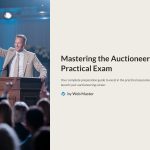 Preparing for the auctioneer practical exam requires a strategic approach. This guide provides a detailed checklist to help you excel in the test, covering everything from understanding the exam structure to practical training techniques.
Preparing for the auctioneer practical exam requires a strategic approach. This guide provides a detailed checklist to help you excel in the test, covering everything from understanding the exam structure to practical training techniques.

Understanding the Exam Format
Before diving into preparation, it’s crucial to grasp the structure of the auctioneer practical exam:
- Exam Components: The test consists of both manual and electronic auction simulations.
- Time Limits: Each auction scenario has a strict time limit, typically around 15-30 seconds.
- Scoring System: Evaluators assess voice clarity, auction pace, and adherence to bidding protocols.
- Passing Criteria: A minimum score (e.g., 70%) is required to qualify.
Knowing these details will help you tailor your preparation effectively.

Creating a Study Plan
A well-structured study plan is essential for efficient preparation. Follow these steps:
- Set a Timeline: Allocate enough time before the exam to practice consistently.
- Daily Practice Sessions: Dedicate at least an hour daily to improving auction skills.
- Utilize Official Materials: Study from official guides, past exam papers, and industry-standard textbooks.
- Join a Study Group: Collaborate with other aspiring auctioneers for knowledge-sharing and feedback.
Consistency is key—regular practice will help refine your skills.
Developing Auctioneering Techniques
Auctioneering requires a unique set of skills. Focus on:
- Voice Training: Work on clarity, projection, and pacing. A strong, confident voice is critical.
- Bid Calling Practice: Rehearse fast and rhythmic bid calling using numerical sequences.
- Gesture Mastery: Learn and practice hand signals and body language to command attention.
- Simulated Auctions: Conduct mock auctions to simulate real-world conditions.
Improving these areas will significantly boost your confidence during the exam.

Understanding Legal and Ethical Guidelines
Auctioneers must adhere to legal and ethical standards. Ensure you:
- Know Auction Laws: Familiarize yourself with regulations governing auctions in your jurisdiction.
- Understand Contract Terms: Learn about bid acceptance, reserve prices, and contract obligations.
- Follow Ethical Practices: Maintain transparency, honesty, and fairness in all transactions.
Compliance with these principles is crucial for a successful career in auctioneering.
Preparing Physically and Mentally
Auctioneering is physically and mentally demanding. Prepare yourself by:
- Improving Stamina: Regular exercise helps build endurance for long auction sessions.
- Managing Stress: Practice relaxation techniques like deep breathing or meditation.
- Getting Adequate Rest: Ensure proper sleep before the exam to stay sharp and focused.
- Dressing Professionally: Wear appropriate attire to present a confident and professional image.
Your physical and mental state will directly impact your exam performance.

Final Practice and Exam Day Tips
As the exam day approaches, finalize your preparation:
- Simulate Exam Conditions: Practice under timed conditions to build confidence.
- Record Yourself: Listen to recordings of your bid calling to identify areas for improvement.
- Review Key Concepts: Go over essential auction terms, procedures, and legal guidelines.
- Stay Calm and Confident: Maintain a positive mindset and trust in your preparation.
On the exam day, arrive early, stay composed, and give it your best shot.
*Capturing unauthorized images is prohibited*







